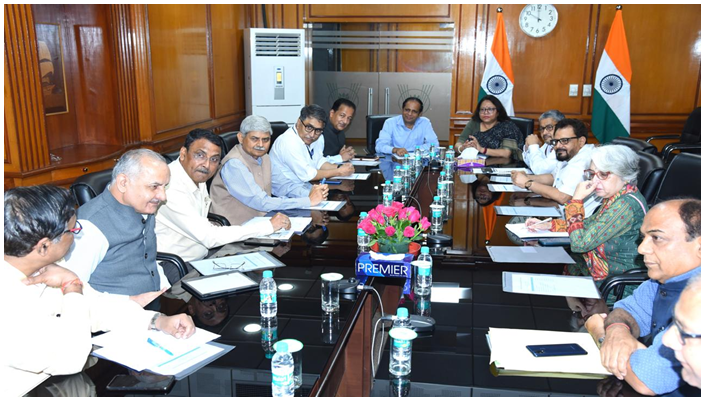Ms. Alka Upadhyaya Calls for Integrated Strategy to Boost Animal Productivity and Fodder Supply
Secretary, Department of Animal Husbandry & Dairying (DAHD) Ms. Alka Upadhyaya and Secretary, Department of Agricultural Research and Education (DARE) and Director General of the Indian Council of Agricultural Research (ICAR) Dr. Himanshu Pathak jointly chaired a high-level meeting. The session took place at the National Agricultural Science Centre (NASC) Complex and included senior officers from both DAHD and ICAR.
Ms. Alka Upadhyaya highlighted the need for a holistic and integrated approach to improving animal productivity, ensuring fodder availability and enhancing vaccine coverage. She emphasized that collaboration between DAHD and ICAR is crucial for achieving these objectives and mitigating the impact of diseases on the livestock sector. She also highlighted the need to curb methane emissions from livestock enteric fermentation as part of decarbonization efforts.
Dr. Himanshu Pathak set the context, stressing the importance of collaboration between DAHD and ICAR. This meeting marked a significant step towards a coordinated and comprehensive approach to addressing key issues in the animal husbandry and dairying sector.
The meeting focused on several key areas:
- Initiatives to enhance the genetic potential of livestock to increase productivity and resilience.
- Strategies to ensure a steady supply of high-quality fodder, essential for livestock health and productivity.
- Development of effective vaccines, including new-generation vaccines for emerging diseases, to mitigate the impact of diseases on livestock.
- Research on the economic impact of diseases and other challenges faced by the livestock sector to inform policy and intervention strategies.
- Strengthening surveillance systems to monitor and combat antimicrobial resistance (AMR).
The meeting concluded with a commitment to further strengthen the collaboration between DAHD and ICAR. The shared goal is to advance the livestock sector in India through innovative research, effective policies, and comprehensive action plans.

